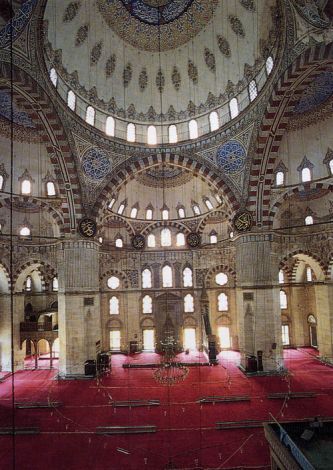YUNUS EMRE SELECTED POEMS I
Preface
For more than seven centuries, Yunus Emre and his poems have lived in the hearts of men and in their speech. Even in small villages in Anatolia, I 1ahow of men who can recite lines of Yunus's poems, which have reached them passing from one generation to the next by word of mouth. In Australia, I once met a Pakistani who knew no Turkish and I heard him sing Yunus Emre's hymns. I also know that those hymns are sung in Albania and the other Balkan countries.
Is it possible to imagine anyone here in Turkey with no feeling of love in his heart for Yunus? Whenever his name is mentioned, the faces of men light up and they feel love surging in them. Our love of Yunus is one of the most precious ties that bind us together. Our nation's debt to him is indeed great.
"How is it" asks Vahabzade, the great Azerbaijani poet, "That although he died in one place, his grave exists in a thousand?" and he answers in the following lines :
Because each day his grave is dug anew in the hearts of men:
His grave is in the grass, the flower, and the rose;
Is he a legend or real, what man is this man,
He is the voice of being, rising from the Turk's kopuz. *
Yunus Emre is, indeed, the voice of being. He is fully aware of what is known as the "existential unity of being" and thus lives in the grass, in flowers, roses and in hearts. What forms the basis of his philosophy is his awareness of the nature of being, the supreme value of man among creation, and the necessity of making man attain awareness of his own value. He is, in other words, a Muslim mystic. He is Yunus the Dervish.
For Yunus, the cause of all existence is love. It is through love that the Creator can be reached. Love is at once the cause and purpose of life on earth. The path leading to the Creator passes through the heart of the human being who holds the highest rank among the created :
I am not here on earth for strife,
Love is the mission of my life.
Hearts are the home of the loved one;
I came here to build each true heart.
Allah, whose being is unlike that of his creation, whose Person lies beyond the grasp of man, but whose works are not inaccessible, has created man as his caliph (i.e. deputy) on earth. He has furnished man with the supreme quality of being the holiest among all creation because he has made him of the same essence as that of the universe. The human being is, in fact, the universe in miniature. He who understands man may also grasp the universe. The road leading to scientific progress is the same as the road leading to knowledge of Allah. Acquisition of scientific knowledge is a debt Allah expects man to pay him; it means attainment of self-knowledge. Self knowledge forms the basis of every science :
Knowledge of science is to know science,
Knowledge of science is self-knowledge;
If you fail to attain self knowledge,
What good is there in your studies?
Each person has his own fate in this world. He or she accepts it and departs. No one remains here forever. What we should really offer and receive is love. It is Love that is the essence of all existence :
Let us love and be loved,
The world shall be left to no one.
Humanity is now going through a new phase. The revolution taking place in science and technology is reshaping the whole world and its value systems. In this age of change, humanity's need for Yunus Emre's philosophy and the culture that gave rise to it will grow. In our present world of computers and robots, what may save man from dwindling into insignificance is Yunus Emre's philosophy, as it emphasises the need for self-knowledge and regards man as the highest among all creation and as the essence of the universe. His philosophy may prevent the human being's decline from a noble status to that of a mere tool in the future. It is for our nation, as heir to this culture, to lead the way. We should, therefore, learn and understand Yunus Emre and his teachings better and help humanity to know him too. In this way we may help our Age of Information change into an Age of Knowledge and of Love.
Namık Kemal Zeybek
Former Minister of Culture of the Turkish Republic
Reference: Ministry of Foreign Affairs of the Republic of Turkey








